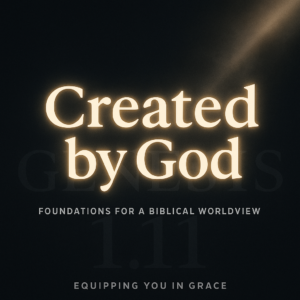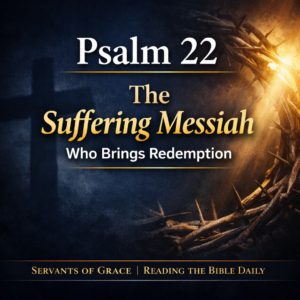⏱️ Estimated Reading Time: 15 min read
Handle the Word of God with Care
By Dave Jenkins | servantsofgrace.org
When we place feelings, emotions, and personal experience before the Word of God, we do more than misstep—we undermine the authority of Scripture itself.
God’s Word is not subordinate to how we feel about it. It doesn’t change to suit the cultural winds or our internal moods. The moment we allow emotions or experience to become the lens through which we interpret Scripture, we begin shaping the Bible to say what we want, rather than submitting ourselves to what God has said.
This is the danger of experience-driven interpretation. Scripture is not a mirror for our preferences—it is the living and active Word of God (Hebrews 4:12). It corrects, rebukes, trains, and equips us—not the other way around.
What We Believe Shows Up in How We Handle Scripture
How we approach the Bible reveals what we truly believe about it. If we say the Bible is inerrant, sufficient, and authoritative—but twist it to fit our feelings—then we betray our confession with our actions.
That’s why interpretation is not a light matter. It’s not a casual activity or a personal journaling session. Interpreting God’s Word is a holy task. Every pastor, every teacher, and every Christian must learn to handle it rightly (2 Timothy 2:15).
This is especially critical for pastors and ministry leaders. As those who are called to shepherd God’s people, your handling of Scripture shapes not only your doctrine, but your discipleship. What you affirm publicly and model privately will form the convictions of your people. Teach them to cherish the Word. Show them what it means to rightly divide it. And protect them from the subtle errors that sneak in through emotionalism and spiritual mysticism.
A Call to Repentance and Reverence
If you’ve been letting your emotions lead your theology, dear Christian, let me encourage you to repent—not with shame, but with the hope of grace. God’s Word is not here to crush you—it’s here to lead you to truth, freedom, and deeper joy in Christ.
Come back to the Scriptures. Sit under them. Let them shape you. God has not left you to wander in confusion—He has spoken. And His Word is good, trustworthy, and sufficient for every area of life.
Treasure the Word Above All
To treasure God’s Word is to submit to it—even when it challenges us, convicts us, or confronts cherished beliefs. We don’t get to shape it. We are shaped by it.
Let us remember this: the Bible is not our tool for self-validation. It is God’s voice to His people. To ignore its authority in favor of how we feel is to close our ears to the Lord Himself.
“But this is the one to whom I will look: he who is humble and contrite in spirit and trembles at my word.” —Isaiah 66:2
The Danger of Contemplative Spirituality: Feeling Over Scripture
One of the most dangerous distortions of our day is the subtle but widespread embrace of contemplative spirituality. It appears spiritual. It sounds peaceful. But at its core, it teaches people to interpret truth through their feelings, emotions, and experiences—rather than through the clear, sufficient, authoritative Word of God.
Figures like Richard Foster, Dallas Willard, and John Mark Comer have become some of the most influential voices in promoting this shift. They are not teaching biblical interpretation rooted in context, grammar, history, and authorial intent—but one that is driven by inner impressions, mystical silence, and emotional impressions.
Richard Foster, in Celebration of Discipline, introduces mystical practices such as “centering prayer” and contemplative silence. (See Celebration of Discipline: The Path to Spiritual Growth, HarperSanFrancisco, 1998, pp. 13, 20, 27–28) These are not found in Scripture and often mirror Eastern meditation rather than biblical meditation, which is always grounded in God’s Word (Psalm 1:2).
Dallas Willard, while respected for his concern about discipleship, heavily emphasized spiritual disciplines and personal experience in ways that blur the lines between biblical formation and subjective mysticism. (See The Spirit of the Disciplines, HarperSanFrancisco, 1988, pp. 9–10, 26–30, 77) His view of transformation too often bypassed careful study of Scripture in favor of mystical union with God.
John Mark Comer, following Willard closely, promotes a model of spiritual life where “hearing God” through emotional impressions and silence is central. (See The Ruthless Elimination of Hurry, WaterBrook, 2019, pp. 107–109, 134, 136–137) But this confuses emotional sensitivity with revelation—and it diminishes the sufficiency of God’s Word in the process.
These teachings train people to trust themselves before they trust the Bible. They reframe spiritual maturity as an inward journey of mystical discovery rather than a life submitted to God’s revealed truth.
Why This Is So Serious
When you elevate feelings over Scripture, you will always interpret the Bible wrongly—because you’re placing your authority above God’s. That is exactly what contemplative spirituality does. It invites people to listen inward rather than study deeply.
This approach is not spiritually neutral. It leads people to mistrust the Bible, to reinterpret difficult truths, and ultimately to reject biblical authority in favor of experience.
The Bible becomes optional when you convince people they can hear from God in silence instead of in Scripture.
This is not new. This is how deception begins—just as it did in Genesis 3: “Did God really say?” When the authority of Scripture is questioned, truth collapses and the soul is left to drift.
So, dear Christian—be discerning. Contemplative spirituality does not lead you closer to God. It leads you away from His Word, and therefore, away from His voice. This trend also shows up in the writings of figures like Henri Nouwen, Brennan Manning, and Sarah Young.
Henri Nouwen, in The Way of the Heart, speaks of moving from the “noise” of the world to inner silence, solitude, and the mystical presence of God, but without sufficient biblical grounding. (See The Way of the Heart, Ballantine Books, 1981, pp. 21–25)
Brennan Manning, in The Ragamuffin Gospel, elevates subjective experience and emotional openness as a path to knowing God, often at the expense of doctrinal clarity. (See The Ragamuffin Gospel, Multnomah, 2000, pp. 33–36, 46–49)
Sarah Young, in Jesus Calling, claims to write the direct words of Jesus received in her quiet time—an approach that undermines the sufficiency and finality of Scripture. (See Jesus Calling, Thomas Nelson, 2004, Introduction and pp. xi–xiii)
📖 How to Spot the Shift
Biblical vs. Mystical Meditation
Biblical Meditation | Mystical/Contemplative Meditation |
Fills the mind with Scripture (Psalm 1) | Empties the mind of thought |
Focuses on God’s truth | Focuses on inner silence or feelings |
Leads to clarity and obedience | Leads to ambiguity and introspection |
Is commanded by God | Is imported from pagan and mystical sources |
Emphasizes objective truth | Prioritizes subjective experience |
Trains the mind through doctrine and truth | Trains the emotions through inner impressions |
Fueled by the Holy Spirit through Scripture | Fueled by spiritual practices apart from Scripture |
Anchored in God’s revealed Word | Drawn from Catholic mystics and New Age writers |
Emotional vs. Biblical Interpretation
Biblical Interpretation | Emotional Interpretation |
Begins with the text and its context | Begins with personal feelings or reactions |
Asks “What does God’s Word say?” | Asks “How does this make me feel?” |
Submits emotions to Scripture | Emotions rules over Scripture. |
Pursues authorial intent and historical meaning | Focuses on personal relevance or resonance |
Seeks to obey God’s revealed truth | Seeks affirmation or emotional validation |
Informed by theology and sound doctrine | Informed by mood, experience, or inner sense |
Leads to conviction, clarity, and action | Leads to comfort, ambiguity, or self-focus |
📜 What the Reformers and Church History Taught
Faithful Christians throughout church history have consistently warned against mystical interpretations and affirmed the final authority of Scripture:
John Calvin: “The fanaticism which discards the Scripture under the pretense of resorting to immediate revelations is a most pestilential pest, which has always been in the Church.”
—Institutes of the Christian Religion, Book 1, Chapter 9, Section 1
Martin Luther: “The Holy Spirit does not lead us apart from the Word of God.”
—Luther’s Works, Vol. 24, Sermons on the Gospel of John, Chapters 14–16
John Owen: “If private revelations agree with Scripture, they are unnecessary, and if they disagree, they are false.”
—The Works of John Owen, Volume 4, p. 220
William Tyndale: “The Scripture is that wherewith God draweth us unto Him… and maketh us believe that He is our Father, and that we shall have life everlasting through Him.”
—Prologue to the New Testament, 1526
J.C. Ryle: “Let us never forget that the Bible is the only rule of faith and practice, and that whatsoever is not read in Scripture, nor may be proved thereby, is to be rejected as false.”
—Old Paths, Banner of Truth, p. 52
Francis Turretin: “The Scriptures alone are the external principle of theology, the rule of faith, the foundation of religion.”
—Institutes of Elenctic Theology, Vol. 1, Topic 2, Q. 1
Charles H. Spurgeon: “Visit many good books, but live in the Bible.”
—Lectures to My Students, p. 195
This modern mysticism is not new—and faithful Christians have always stood against it.
🔧 Practical Ways to Guard Against Emotion-Driven Interpretation
🛡️ Cultivating Biblical Discernment
Biblical discernment is not about skepticism or suspicion—it’s about Spirit-enabled clarity and wisdom grounded in the Word of God. As Paul wrote, we are to “test everything; hold fast what is good” (1 Thessalonians 5:21). Discernment guards the heart and mind from error by filtering every thought, teaching, and impression through the lens of Scripture.
Discernment involves:
- A humble submission to God’s revealed truth (James 1:21)
- A growing knowledge of Scripture’s full counsel (Acts 20:27)
- A readiness to reject even popular ideas if they contradict God’s Word (Galatians 1:6–9)
- A careful awareness of emotional influence in spiritual matters (Proverbs 14:12)
- The courage to call error what it is, even when it costs us culturally (2 Timothy 4:2–4)
“Solid food is for the mature, for those who have their powers of discernment trained by constant practice to distinguish good from evil.” —Hebrews 5:14
Discernment is both a gift and a discipline. It matures through exposure to sound teaching, regular study of the Scriptures, and wise counsel from faithful shepherds (Proverbs 11:14; Colossians 1:9–10). It means refusing to follow every new trend simply because it “feels” spiritual or draws a crowd (Ephesians 4:14).
We must ask not only, “Is this right?” but also, “Does this lead me to greater obedience to Christ and confidence in His Word?” (John 14:15; Psalm 119:105)
Without discernment, Christians become vulnerable to emotionalism, false teaching, and spiritual confusion. With discernment, we grow in maturity, remain anchored in the truth, and help others do the same (Philippians 1:9–10).
📖 Historical Models of Discernment
Athanasius of Alexandria (c. 296–373): “The sacred and inspired Scriptures are sufficient to declare the truth.” He stood against the world in defense of Christ’s divinity based solely on Scripture. (Contra Gentes, Part I)
Martin Luther (1483–1546): “My conscience is captive to the Word of God.” At the Diet of Worms, he refused to recant, not based on feelings, but because Scripture alone bound his soul. (Luther’s Works, Vol. 32)
John Newton (1725–1807): “Truth is a sacred thing. The Word of God is the only standard of truth; to that we must appeal in every debate.” (from his collected letters)
Charles Spurgeon (1834–1892): “Discernment is not knowing the difference between right and wrong. It is knowing the difference between right and almost right.” (The Sword and the Trowel, 1887)
Discernment is not optional. It is essential for personal faithfulness, for pastoral ministry, and for guarding the church from error in every generation.
📘 Practical Application
- Anchor Everything in Scripture
Biblical meditation is not emptying your mind—it is filling it with the truth of God’s Word, dwelling on it, praying through it, and applying it in obedience. Psalm 1:2 says the blessed man’s “delight is in the law of the LORD, and on his law he meditates day and night.”
Thomas Watson: “The reason we come away so cold from reading the Word is, because we do not warm ourselves at the fire of meditation.”
Richard Baxter: “Meditation is the affecting of the heart with the truth of Scripture.”
John Owen: “Be constant in reading the Scripture; always meditate thereon: be much in prayer, and you shall be sensible of a mighty increase in all grace.”
Do not interpret the Bible based on feelings or cultural pressure. Make the text itself your starting point. Prioritize regular, contextual reading and meditation. Let God’s Word define your convictions—not your instincts, intuition, or impressions.
- Reject Practices Not Found in the Bible
Avoid spiritual techniques rooted in mysticism, Eastern religion, or psychological self-help. If a practice is not taught or modeled by Christ or His Apostles, it does not belong in the church. Test everything against Scripture (1 Thess. 5:21).
Examples to watch for:
- Centering Prayer
- Breath prayers
- Lectio Divina (when used to “hear fresh words” beyond the text)
- Visualization or imaginative prayer
- Journaling as prophecy (e.g., Jesus Calling)
- Soaking prayer
Faithful responses:
- The Reformers emphasized sola Scriptura.
- The Westminster Confession warns against “new revelations.”
- John MacArthur critiques these practices in Charismatic Chaos.
- ACBC warns against experience-driven spirituality.
- Interpret Scripture with Scripture
Use the Bible’s internal clarity to guide your understanding. Let clearer texts interpret more complex ones. Prioritize authorial intent and context.
Augustine: “Scripture is its own interpreter.”
—On Christian Doctrine, Book 3
Westminster Confession of Faith: “When there is a question about the true and full sense of any Scripture…it must be searched and known by other places that speak more clearly.”
- Sit Under Sound Preaching
Expose yourself to faithful, expositional teaching that exalts Christ and expounds the text accurately. Avoid emotionally driven preaching that replaces biblical truth with platform performance.
John Calvin: “Wherever we see the Word of God purely preached and heard, there a church of God exists.”
D. Martyn Lloyd-Jones: “Preaching is theology coming through a man who is on fire.”
Sound doctrine fuels godly living (Titus 2:1).
- Pray for Discernment
Discernment is a Spirit-enabled discipline. Ask the Lord to sharpen your understanding, reveal error, and anchor you in the truth. Ask for wisdom to recognize half-truths and courage to stand against them (James 1:5).
Jonathan Edwards: “A true and saving faith is accompanied with spiritual discernment.”
—Religious Affections
- Use Trusted Resources
Study with tools that submit to Scripture’s authority—books, commentaries, podcasts, and teachers who are doctrinally sound and Christ-exalting. Avoid resources that offer centering emotional experiences or redefine truth.
Charles Spurgeon: “A time will come when instead of shepherds feeding the sheep, the church will have clowns entertaining the goats.”
—An All-Round Ministry, p. 15
Ask: Does this resource deepen my trust in God’s Word—or distract from it?
🧠 Reflection Questions
- Am I approaching Scripture to be transformed by God’s truth—or to confirm what I already feel or believe?
- Are there spiritual practices I use that lack clear biblical support?
- When I’m convicted or confused, do I instinctively turn to the Bible—or to influencers, books, or feelings?
- Do I evaluate sermons and content by Scripture—or by how emotionally “resonant” they are?
- Would those closest to me say I submit to God’s Word—or filter it through my preferences?
- Am I regularly praying for discernment and seeking counsel from biblically faithful leaders?
📋 Discernment Checklist for Teachers and Resources
- 📖 Do they treat Scripture as sufficient, clear, and final?
- 💬 Do they quote mystics or focus on “inner voice” or “silence”?
- 🔍 Do they call you to the Word—or to your emotions?
- ✝️ Are their practices modeled by Jesus or the Apostles?
- 👑 Does their teaching glorify Christ—or elevate personal experience?
💬 Final Encouragement
To turn away from Scripture as our final authority is to turn away from God’s final and closing Word itself.
Let us be people who tremble at His Word, love His Word, and handle His Word with care.
🎧 Related Episodes & Articles:
- 🎙️ Equipping You in Grace: Why the Authority of Scripture Still Matters
- 🎧 Contending for the Word (May 27): The Slippery Slope of Soft Evangelicalism
- 📖 Theology for Life Magazine: The Sufficiency of Scripture
- For more from our June 2025 series please visit, Scripture for All of Life.
Frequently Asked Questions
What does it mean to handle the Word of God “rightly”?
To handle God’s Word rightly means to interpret it in context, seeking the author’s original intent using proper tools like grammar, historical background, and Scripture’s unity. It involves submitting our feelings to the text, not the other way around (2 Timothy 2:15).
Is contemplative prayer the same as biblical meditation?
No. Biblical meditation fills the mind with God’s Word (Psalm 1:2), while contemplative prayer often empties the mind and seeks inner impressions. The former is commanded in Scripture; the latter has roots in mysticism.
Can Christians hear from God outside of Scripture?
God can guide believers by His Spirit, but He never contradicts His written Word. The final authority for faith and practice is Scripture alone (2 Timothy 3:16–17).
Why is emotionalism dangerous in interpreting Scripture?
Emotions aren’t inherently bad, but when they become the lens through which we interpret God’s Word, we risk twisting the truth. Sound doctrine requires submission to Scripture, not subjective feeling.
How can I grow in discernment as a Christian?
Discernment grows through prayer, regular study of Scripture, sitting under faithful preaching, learning theology, and evaluating ideas by God’s Word (Hebrews 5:14; 1 Thessalonians 5:21).



